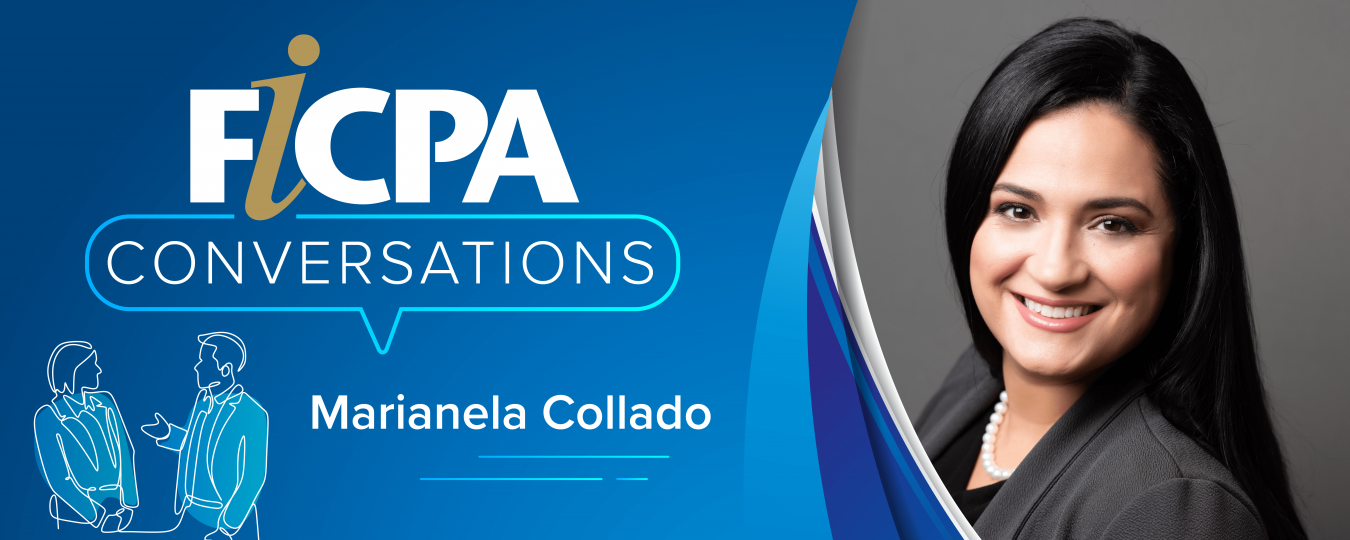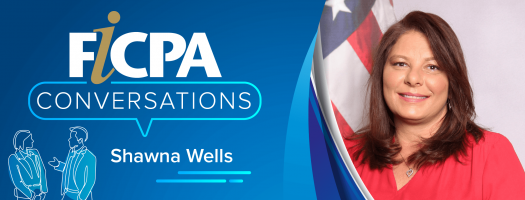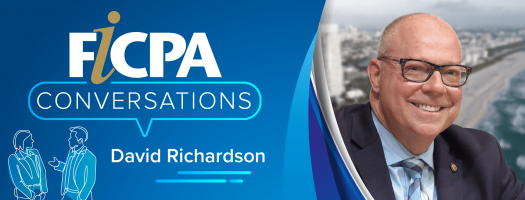
Our FICPA Conversations series returns as we celebrate Hispanic Heritage Month!
For this conversation, we’re joined by the CEO of Tobias Financial Advisors: Marianela Collado.
Marianela has been a member of the FICPA since she moved to South Florida in 2013 when she quickly joined our Women’s Leadership Committee.
Now a member of our Task Force on Diversity & Inclusion, she hopes to use her personal experience to inspire students to pursue a career as a CPA.
Tell us about your family’s story and your path to becoming a CPA.
I was born and raised in Queens, New York. My parents came to the U.S. from the Dominican Republic and were hard-working immigrants. They didn’t stress the importance of education, but they knew you had to work hard and make smart choices with your money to be successful. I loved school so much that I originally wanted to be a teacher. Being the youngest of four children, with three older brothers, I grew up having to prove that I could do what my brothers did – and more. I was allowed to go to high school under the condition that I go to the same vocational school as my older brother. As upset as I was, I discovered the school had an accounting and secretarial track, which I much preferred to plumbing and electrical. I graduated with an amazing accounting foundation.
It wasn't until I found myself in college, on the education track, that I realized something was missing. I thought back to a conversation I once had with a friend in high school accounting. He said he was going to college to study accounting and become a CPA. I remember asking, "What is a CPA?" And he answered in such a way that it made it seem like a superpower! "A Certified Public Accountant," he replied. "It's the highest credential in the accounting field." That stuck with me, and it wasn't long before I changed my major to accounting.
I quickly became my parents' go-to person for finances, from helping them pay their bills to handle their taxes. I remember thinking, "God, this is so wrong." It was such a challenge for them, and I knew that I never wanted to be in that position. I was determined to be the first in my family to go to college and graduate, and I was. I put myself through school because I never thought it should have been my parents' responsibility to cover my college education. I thought, "How dare I ask them? I need to figure it out." I mapped out all four years – what it would cost me and how much I needed to work. I ended up working practically full time while going to school full time.
I had already started working as a bookkeeper for a construction company in Manhattan. It was the 1990s, and their books were actual books – these big ledgers. There I was, a high school kid, and I'm converting all their ledgers into QuickBooks. I set up their entire billing system to be digital because they were still typing up requisition forms on an actual typewriter.
You must have been a pretty impressive bookkeeper to convince someone to let you, as a teenager, digitize their entire business.
You have no idea. The owner would yell at me – half in English and half in Italian! "Marianela! What are you talking about? What are you doing?" I got yelled at like I was part of the family. He would call me "mia nipote" – "my niece."
For months, I kept the ledgers side by side with QuickBooks. I had to convince him that I could do everything on QuickBooks that we were doing in these huge 20x11 ledgers.
That experience informs my approach with clients. I always think, "Well, how would I explain this to my parents? How do I help you understand what I'm doing?" I've been doing that since I was 10, and I tell that to my team today. If you want to be successful with a client, you need to be able to explain whatever it is we're doing for them as if they were your parents or your grandparents. Don't assume that they know technical things, and don't use a lot of jargon that will make the client uncomfortable. Explain things in a way that your parents or grandparents will understand.
What kind of advice would you give to a young person today looking at the accounting profession but who doesn't see anyone who looks like them? I imagine there have been professional settings where you were the only woman or the only person of color in a room.
Yes, and I also came into the field when women were not as giving, not as nurturing. There was a mentality: "I needed to go through that, so you should too. I'm not going to make it easy for you." That was my experience coming into the field in the early 2000s.
Fortunately, I think that has shifted a lot, and I'm hoping to be part of that change where we're looking to help the next generation and serve as mentors. I think it's important to find a mentor either in your firm or through organizations like the FICPA. It's essential for young people who are considering this career to know that people care and will genuinely look out for them. Finding the right firm and working for the right manager will make all the difference in your ability to succeed. Make sure that you work for someone who appreciates you, recognizes your hard work, and is willing to invest in your success.
Given your experience, why was it important for you to lend your voice to the FICPA's Diversity and Inclusion Task Force?
Coming from the Women's Leadership Committee, it was a natural progression. I want to help women succeed in our industry and reach their highest levels of leadership, and I also hope to change the landscape for minority groups in our field.
It's like you said: Often, I found myself to be the only woman at the table and the only Latina. I hope that I can be an inspiration to other people. If you don't see someone like you, someone from your background who made it in a given profession, you might be intimidated to venture down that path.
We hope to develop programs to help employers see the value of having team members from different backgrounds and provide them with the tools to help them further diversity, equity, and inclusion efforts within their firm. We also want to assist students and new CPAs via mentorship, where we can help coach them.
I never doubted myself because I'm Latina or I'm a woman. I decided I was going to work my butt off, and that was it. But I recognize that I may have had thicker skin than most. I'm hoping to inspire young people to show there is a real future for them as a CPA.
You have so many options. I'm in financial planning and wealth management, but there's finance, industry, tax, audit.
When you pass the exam, and you're licensed, the world is your oyster.

